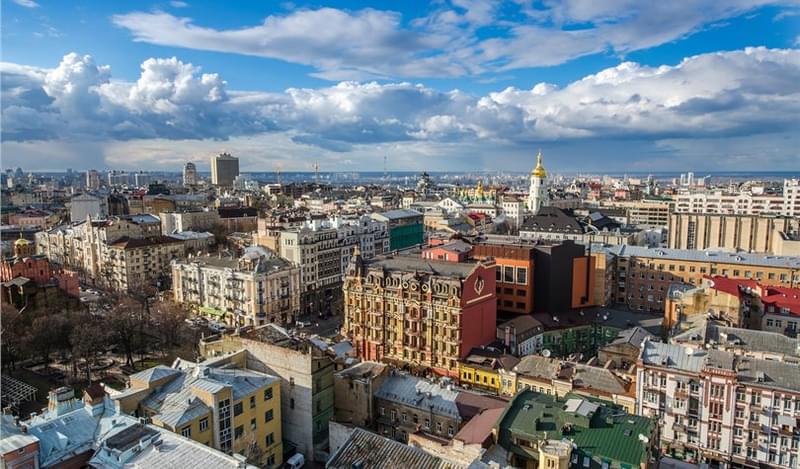This past weekend, Ukraine hosted the first round of presidential elections, with 39 candidates participating. Exit polls show Volodymyr Zelensky came in first, with more than 30%, followed by the incumbent president Petro Poroshenko who garnered 16% of votes. The second round will be held on April 21.
Located between more authoritarian Russia and more democratic Europe, Ukraine, the largest country in Eastern Europe by area and population, is struggling to forge its next chapter following the Orange Revolution of late 2004 and Euromaidan in February 2014. Although each revolution led to serious political changes and moved the country toward democracy, reforms failed to fully take hold. As a result, Ukraine remains one of the last places in Eastern Europe struggling with economic development and entrenched corruption. This political moment could offer a way out.
Not a Fortuity
The first round outcome was both expected and unexpected. Expected—because throughout the entire electoral campaign Zelensky was the leader in polls, gradually increasing his advantage. Unexpected—because Zelensky has no political experience and, despite it being his first time participating in elections, he outstripped experienced politicians by a significant margin. His more seasoned competitors included former prime minister Yulia Tymoshenko, the former minister of defence Anatoly Gritsenko, and the former deputy prime minister and leader of the main opposition party Yuri Boiko.
Many analysts express scepticism about Zelensky’s presidential prospects, calling him a comedian and blaming him for his lack of political experience and his team. (Though Zelensky is indeed an actor with roles in many comedies and talk shows, he is a successful businessman who built a company that operated for 15 years and is one of the country’s biggest taxpayers, all accomplished without scandals).
At the same time, the success of a non-system politician is quite natural: Zelensky, at 41 years old, represents a generation of Ukrainians who became the driving force of Euromaidan five years ago (although he did not take part in those events). Despite launching a revolution, this generation could not nominate its representatives either in the presidential elections nor did they secure much power in the parliament, where they obtain just a dozen seats out of 450. The fruits of political victory went to politicians who for many years moved from one public position to another, and who, as practice has shown, failed to make enduring political and economic reforms. So now the Ukrainian voters refused to trust any of them.
The Results of Half-Hearted Reforms
In the first three years after Euromaidan, Ukraine has implemented several significant reforms that enabled a return to macroeconomic discipline and resolution of a banking crisis. As a result, the economy started to recover in 2016 despite the Russian annexation of Crimea and invasion of the Donbas region that led to the loss of close to 20% of the economic potential of the country. However, afterwards, many essential reforms were frozen, if not reversed.
A large-scale IMF program, adopted in Spring 2015, stalled after two years and demanded a comprehensive review. Although in January 2019 the IMF decided to resume its support, almost immediately the Ukrainian government failed to fulfill its promises of structural reforms, primarily in privatization and the fight against corruption.
The fight against corruption, symbolized by the creation of the National Anticorruption Bureau of Ukraine (NABU), gradually faded. On the one hand, those in President Poroshenko’s closest circle began actively converting power into property. On the other, the heads of the Prosecutor General’s Office and the Anti-corruption Prosecutor’s Office started blocking NABU activities. As a result, on the eve of the elections, Ukraine learned about large-scale corruption in Ukroboronprom, a company engaged in the production of weapons that is controlled by the president and is governed by his appointees. One month before elections, the presidential administration orchestrated a decision by the Constitutional Court to eliminate the law on illicit enrichment, which freed from responsibility dozens of high-ranking officials charged with corruption.
A thoroughly designed judicial reform, aimed at expelling unscrupulous judges, stalled at the implementation stage when the presidential administration re-nominated many of the old members of the Supreme Court and promoted many judges who are well-known to society for violating principles embraced by the High Council of Justice.
For many years, the introduction of private ownership of land has been blocked in the country, which hinders agricultural development, an essential element of the Ukrainian economy. In addition, although one of Ukraine’s most severe problems is energy dependence on Russia, the government is blocking any transformation in the sphere of subsoil use.
“Request for a “New Wave”
Ukraine’s problems are visible to ordinary citizens: low and slow-rising living standards are triggering a mass exodus of the country’s labor force to Eastern European countries, which undermines the prospects for economic growth. At the same time, Ukrainian voters express disillusionment with traditional politicians and openly express doubts about their ability and desire to improve the state of affairs in the country. In this context, the emergence of a popular non-system politician was a response to the historical challenges facing Ukraine.
The traditional political system and the mainstream media remain under the control of politicians closely connected with the oligarchic business sector. In such a status quo, it is practically impossible for a new independent politician to ascend the political ladder—he will lack the opportunity to communicate with voters on TV and will have difficulty financing his campaign. Therefore, it was not by chance that during the political revival in the fall of 2018 that two media stars emerged as potential candidates: a famous rock singer, Svyatoslav Vakarchuk, and Zelensky. They have almost 100% recognition in the country and are not associated with the old political construct. For many observers and supporters of democratic reforms, Vakarchuk seemed to be a more preferable and intelligent candidate, but he refused to enter the race.
The results of the first round of the presidential elections showed that the demand for reforms in Ukraine is very high—the voters want a radical acceleration of the movement toward western standards and pin their hopes on the new generation of politicians.
However, even in the event of a victory, Zelensky will not easily meet these expectations. According to the constitution, Ukraine is a parliamentary-presidential republic in which the power of the president is limited to foreign policy, defence, and law enforcement. The government is formed by a parliamentary majority and does not depend on the president having full independence implementing social and economic policies. Indeed, traditionally, the parliamentary majority includes representatives of several parties, and, as a rule, it includes representatives of the president’s party. At the same time, gridlock usually prevails when the government and the president represent opposing political forces, a situation that emerged between 2007 and 2009 when Viktor Yushchenko was president, and Viktor Yanukovych was prime minister.
Elections to the Verkhovna Rada (Ukraine’s parliament) will take place at the end of October 2019 and only then will the inclination of voters to favour radical reforms become clear.
What Should the West Do?
Undoubtedly, the strategic interest of the west is the decisive transformation of Ukraine, symbolized today by Zelensky. On the one hand, this will allow resistance against the spread of authoritarian tendencies in Eastern Europe, which Petro Poroshenko signifies. On the other hand, Ukrainian reforms, if successful, will become a case study for the people of Russia and Belarus, living under pressure from state propaganda that unrelentingly conveys that democracy is the wrong choice for Eastern Slavic peoples and cannot deliver economic success.
In this situation, Western countries have two options. The first is to sit back expectantly, stating that Ukraine must first demonstrate its willingness and desire to carry out reforms, then prove its intentions with deeds. The West took a similar position in the early 1990s concerning Russia, and today we are well aware of what this has led to. The second option is to become an active ally of the people of Ukraine.
To follow the second path, the West must recognize that Zelensky epitomizes not the grimace of history, which pushed a random person to the top of the political life, but is a manifestation of the natural response of Ukrainian society to the historical challenge facing the country: either a decisive move towards the West or stagnation and degradation of the state.
Author’s note: I deliberately did not discuss everything connected with the Russian aggression against Ukraine. But not because I think this is not important, but because the discussion of this topic will quickly lead away from the analysis of those internal problems that Ukraine is facing, without solving which it is impossible to build optimistic scenarios for the future of this of this country.
This article was originally published on the by Brookings Institute.





